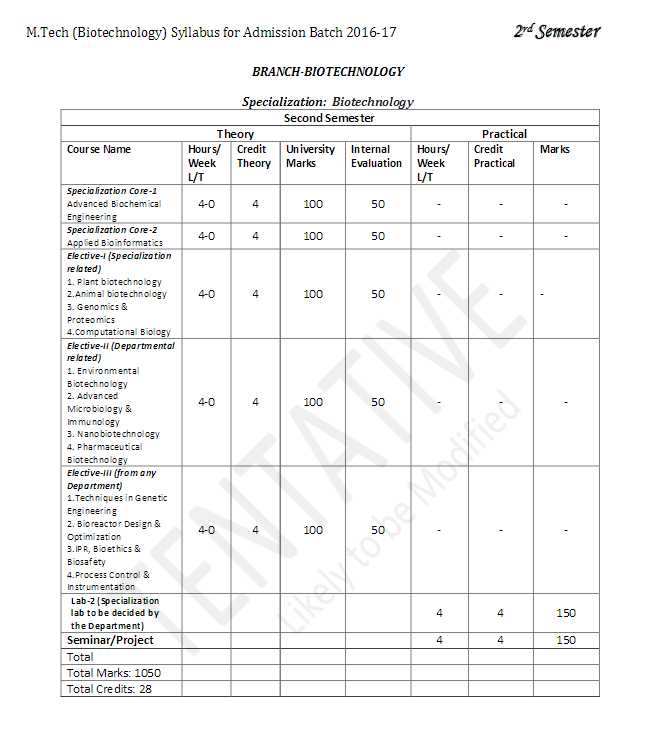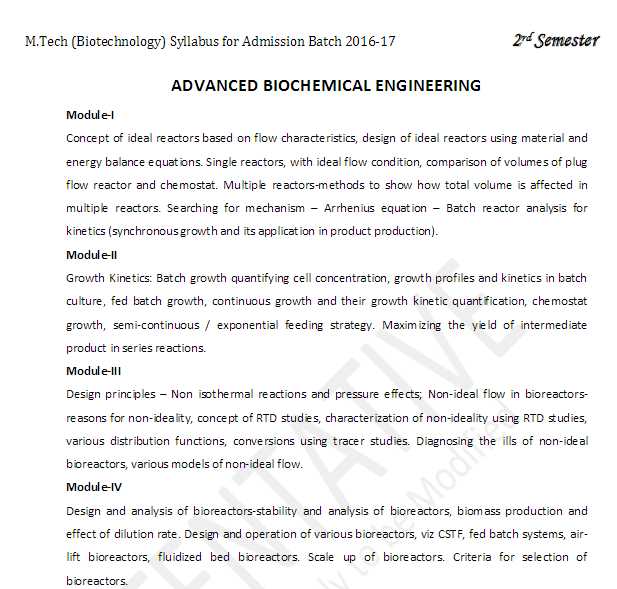|
#2
June 28th, 2017, 01:46 PM
| |||
| |||
| Re: M Tech Syllabus BPUT
As you are looking for syllabus of M.Tech Biotechnology 2nd Semester Course of BPUT University Course, so here is complete syllabus: BPUT University M.Tech Biotechnology Course 2nd Semester Syllabus ADVANCED BIOCHEMICAL ENGINEERING Module-I Concept of ideal reactors based on flow characteristics, design of ideal reactors using material and energy balance equations. Single reactors, with ideal flow condition, comparison of volumes of plug flow reactor and chemostat. Multiple reactors-methods to show how total volume is affected in multiple reactors. Searching for mechanism – Arrhenius equation – Batch reactor analysis for kinetics (synchronous growth and its application in product production). Module-II Growth Kinetics: Batch growth quantifying cell concentration, growth profiles and kinetics in batch culture, fed batch growth, continuous growth and their growth kinetic quantification, chemist at growth, semi-continuous / exponential feeding strategy. Maximizing the yield of intermediate product in series reactions. Module-III Design principles – Non isothermal reactions and pressure effects; Non-ideal flow in bioreactorsreasons for non-ideality, concept of RTD studies, characterization of non-ideality using RTD studies, various distribution functions, conversions using tracer studies. Diagnosing the ills of non-ideal bioreactors, various models of non-ideal flow. Module-IV Design and analysis of bioreactors-stability and analysis of bioreactors, biomass production and effect of dilution rate. Design and operation of various bioreactors, viz CSTF, fed batch systems, airlift bioreactors, fluidized bed bioreactors. Scale up of bioreactors. Criteria for selection of bioreactors. APPLIED BIOINFORMATICS Module-I Sequence-alignment methodologies: Sequence databases; Similarity matrices; Pairwise alignment: Features of dynamic Programming, alignment by Bayesian Statistical Methods, multiple sequence alignment: local multiple sequence alignment: MEME, PSSM, HMM ( algorithms and applications) Progressive methods for global multiple sequence alignment: CLUSTALW, PILEUP, T-COFFEE; Statistical significance of alignment results; Module-II Pattern analysis in sequences and Phylogenetic tree construction methods: Motif representation, Markov models; .Distance Based methods: clustering based methods, optimality based methods: Fitsch -Margoliash and Minimum evolution methods, Neighbour joining and related neighbour methods Character Based methods: Maximum parsimony methods, Maximum likely hood method, genetic algorithmand Phylogenetic tree evaluation: Boot strap analysis; dendrogram and applications Module-III Structure-Prediction of Biomolecules with applications in Bioinformatics: Structure classification of proteins (SCOP, CATH); Secondary structure prediction of various protein categories (e.g. transmembrane proteins and helical proteins), RNA secondary structure prediction methods. Module-IV Patterns, motifs and Profiles in sequences: Derivation and search methods; Derived Databases of patterns, motifs and profiles e.g.Prosite, Blocks, Prints-S, Pfam; Overview of tertiary structure prediction methods; algorithms for modelling protein folding; algorithms for 3D structure prediction with representative examples Protein structure prediction by comparative modelling approaches (homology modelling and fold recognition); ab initio structure prediction methods. PLANT BIOTECHNOLOGY Module-I Plant Genomics and Molecular Mapping: Introduction Genome mapping; Identification of candidate genes using: genetic information (positional cloning); biochemical and expression analysis (microarray analysis, proteomics, metabolomics); Characterization and functional analysis of candidate genes using: transformation, mutant populations, knockout systems; Heterologous expression systems. Structural and Functional genomics; application of sequence based and structure-based approaches to assignment of gene function. Molecular marker and its type ( RFLP, RAPD, AFLP, SSR, STS, EST, SNP); Constructing molecular maps; Molecular tagging and mapping of genes/traits; Marker assisted selection of qualitative and quantitative traits. Construction of genetic and physical map; Gene mapping and cloning; QTL mapping and cloning; Nucleic acid and Protein arrays: basic principles, instrumentation and applications in plant genomics, Identification of disease genes. Module-II The Gene transfer Techniques for the production of Transgenic: Overview of different gene transfer methods, plant vectors for transformation, transgene analysis and expression. Indirect Gene transfer Methods: structural features of Ti plasmid, mechanism of gene transfer to plants Integration of TDNA into plant genome, Molecular events in Agrobacterium mediated gene transfer. Module-III Direct gene transfer methods: Particle bombardment mediated transformation, Mechanism, Particle gun design, parameter for effective transformation; silicon carbide fibre mediated transformation and alternative methods. Reporter genes, Selectable and scorable markers, binary and Cointegrative vectors, Removal of marker genes, Applications and limitations of Agrobacterium gene transfer, Concept of marker free transgenic plants. Plastid engineering: Introduction, importance, scope and technique. Module-IV Crop Improvement and Agro-industrial biotechnology: Genetic Engineering for Herbicide resistance; Genetic Engineering for Biotic and Abiotic Stress Resistance/Tolerance; Genetic engineering for Improvement of crop yield and quality: Protein, lipids, carbohydrates, vitamins & mineral nutrients; Applications in Agro-industry: Microbes in agriculture , Production and utilization of essential amino acids, chemicals from micro-algae. Agro-waste utilization; Mycorrhiza in agriculture and forestry. BPUT University M.Tech Biotechnology Course 2nd Semester Syllabus   |